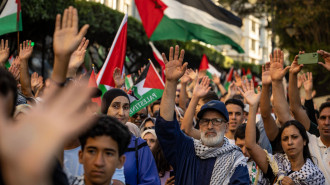UAE hunger strike prisoner Imran al-Radwan's health 'rapidly declining'
UAE hunger strike prisoner Imran al-Radwan's health 'rapidly declining'
Imran al-Radwan began his hunger strike on 25 May after allegedly being sexually assaulted by prison guards
2 min read
The health of prisoner Imran Al-Radwan is rapidly deteriorating [Twitter]
Family members and supporters of an Emirati "prisoner of conscious" say his health is "rapidly declining" after spending nearly six weeks on hunger strike.
Imran al-Radwan is being denied medical treatment by UAE prison authorities despite being in agonising pain, a family member who wished to remain anonymous told The New Arab.
Imran al-Radwan is being denied medical treatment by UAE prison authorities despite being in agonising pain, a family member who wished to remain anonymous told The New Arab.
During the family's last visit to see Radwan on Monday, they said his rapid weight loss made him "unrecognisable". The family were only allowed to see Imran for three minutes before being told to leave the prison.
Imran had complained of severe kidney pain, a sharp drop in blood sugar levels, and suffering dehydration. He has lost 10kg since he began his hunger strike on 25 May.
His speech was slow and the prisoner found it difficult to move, the family member said.
Denial of medical treatment
Radwan had repeatedly pleaded with prison authorities for medical treatement, which family members say was denied.
Although he was provided with glucose he was not given any pain killers or allowed to see a specialist regarding a stomach condition, his family claimed.
They also said that guards threatened to force feed him when he asked for a doctor.
This would be done through an excruciating process where nutrients are forcibly administered into his body by a pipe through his nose.
Read also: Emirati activist forcibly returned to UAE handed 10-year sentence
This could put the prisoner at risk of serious health complications - such as haemorrhages - especially during the process of inserting the feeding tube, which is usually done violently. This process can also damage or lacerate the nasal membranes, oesophagus or stomach itself.
Sexual harassment
Denial of medical treatment
Radwan had repeatedly pleaded with prison authorities for medical treatement, which family members say was denied.
Although he was provided with glucose he was not given any pain killers or allowed to see a specialist regarding a stomach condition, his family claimed.
They also said that guards threatened to force feed him when he asked for a doctor.
This would be done through an excruciating process where nutrients are forcibly administered into his body by a pipe through his nose.
Read also: Emirati activist forcibly returned to UAE handed 10-year sentence
This could put the prisoner at risk of serious health complications - such as haemorrhages - especially during the process of inserting the feeding tube, which is usually done violently. This process can also damage or lacerate the nasal membranes, oesophagus or stomach itself.
Sexual harassment
Radwan was jailed in 2013 for "dangering national security", as part of a clampdown on activists named by supporters as the UAE 94.
He began his hunger strike after being allegedly sexually assaulted by Nepalese prison guards at al-Razeen jail in May.
His family say he and other prisoners were lined up in the jail and strip-searched. The checks were conducted in a "humiliating" manner, with guards being unnecessarily invasive during their searches. The family claimed he was deliberately molested during the process.
He began his hunger strike after being allegedly sexually assaulted by Nepalese prison guards at al-Razeen jail in May.
His family say he and other prisoners were lined up in the jail and strip-searched. The checks were conducted in a "humiliating" manner, with guards being unnecessarily invasive during their searches. The family claimed he was deliberately molested during the process.
The UAE has become increasingly authoritarian and experienced a major clampdown on activists since the 2011 Arab Spring. Authorities have been accused of suppressing free speech and "terrorising residents" through mass-surveillence.
There have also been reports of prisoners being tortured in UAE prisons and left vulnerable to sexual abuse and placed into solitary confinement.
There have also been reports of prisoners being tortured in UAE prisons and left vulnerable to sexual abuse and placed into solitary confinement.

![Palestinians mourned the victims of an Israeli strike on Deir al-Balah [Getty]](/sites/default/files/styles/image_684x385/public/2024-11/GettyImages-2182362043.jpg?h=199d8c1f&itok=xSHZFbmc)


![The law could be enforced against teachers without prior notice [Getty]](/sites/default/files/styles/image_684x385/public/2178740715.jpeg?h=a5f2f23a&itok=hnqrCS4x)
 Follow the Middle East's top stories in English at The New Arab on Google News
Follow the Middle East's top stories in English at The New Arab on Google News


![Left-wing candidate Jill Stein campaigns in Michigan in October [Getty]](/sites/default/files/styles/image_330x185/public/2024-11/GettyImages-2176828619.jpg?h=199d8c1f&itok=h2FXzBuP)